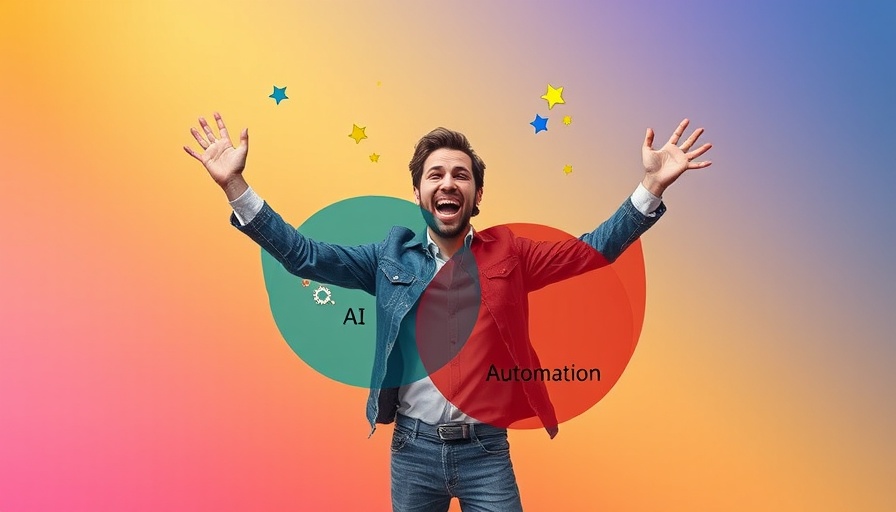
Agentic AI: A New Era in Advertising
As we step into 2025, the landscape of digital advertising is on the verge of a significant transformation fueled by agentic AI. Unlike traditional AI, which performs tasks under human instruction, agentic AI operates semi-autonomously, making decisions and optimizing workflows on its own. This innovative technology is set to refine not only how businesses engage in digital marketing but also how advertising teams function in their daily operations.
The Four Advertising Roles Revolutionized by Agentic AI
The shift towards agentic AI ushers in profound changes across four key roles in advertising: strategic planning, campaign management, audience segmentation, and data analysis. With the sheer volume of data that marketers handle today, a staggering one in four agencies reports needing over a week to launch a new campaign. By streamlining these roles, agentic AI can empower teams to meet growing consumer expectations for personalization while minimizing operational costs.
1. Strategic Planning: Beyond the Basics
In the realm of strategic planning, agentic AI has the potential to redefine how businesses approach their marketing efforts. Historically, marketing strategies relied heavily on prevailing market trends and historical data. Agentic AI can assess real-time data, evolving market conditions, and consumer behaviors, enabling marketers to make informed, agile decisions. The predictive analytics capabilities of agentic AI translate data into actionable insights, ensuring that strategic decisions are not just timely but also effective in resonating with target audiences.
2. Campaign Management: Efficiency at Scale
Collaborations between AI and automation mark the new operational norm in campaign management. Agentic AI can monitor campaign performance continuously, automatically adjusting parameters such as bidding strategies and ad placements based on incoming data. This operational agility allows advertising teams to launch campaigns faster and more efficiently. In conjunction with automation, agentic AI can focus on maximizing resource utilization, ensuring that marketers invest their time on creative and high-level strategies rather than tedious reporting and data collection.
3. Audience Segmentation: Personalization at Unmatched Levels
Audience segmentation has traditionally been a labor-intensive process, often leading to missed opportunities for targeting the right consumers at the right time. Agentic AI can analyze vast amounts of consumer data in real-time, creating hyper-personalized experiences across various touchpoints. By examining browsing habits and past purchasing behaviors, agentic AI technologies can deliver tailored content and product recommendations that transform user engagement, fostering loyalty and driving conversions.
4. Data Analysis: Turning Insights into Actions
Data analysis has become increasingly complex as marketers juggle multiple data sources, often leading to analysis paralysis. Agentic AI tackles this challenge by processing and analyzing data autonomously, identifying trends that may go unnoticed in traditional analytics environments. This technology not only improves reporting accuracy but also offers actionable insights that marketers can mobilize quickly, enhancing decision-making processes and ultimately boosting campaign performance.
The Importance of Governance and Control
Despite its transformative potential, the integration of agentic AI in advertising does not come without risks. Ensuring that teams maintain governance over AI systems is critical in leveraging agentic AI responsibly. Marketers must navigate the complexities of data security and algorithmic biases while designing workflows that enhance collaboration between humans and machines. Careful oversight assures that AI benefits businesses without compromising ethical standards or consumer trust.
The Road Ahead: Preparing for the Inevitable
As the collective capabilities of agentic AI unfold across various advertising roles, marketers should embrace this technology as a strategic partner rather than a simple automation tool. The opportunities for growth, scaled efficiency, and improved consumer interactions are tremendous. Ultimately, the future of advertising lies in harnessing agentic AI technologies to redefine the relationship between brands and consumers. As we continue to innovate, the collaboration between human intellect and machine capability will push creative boundaries and elevate marketing outcomes.
Now's the time to explore how adopting agentic AI could revolutionize your marketing strategy. Be proactive about integrating this innovative technology into your operations and reconsider how your teams can adapt to this changing landscape.
 Add Row
Add Row  Add
Add 


Write A Comment